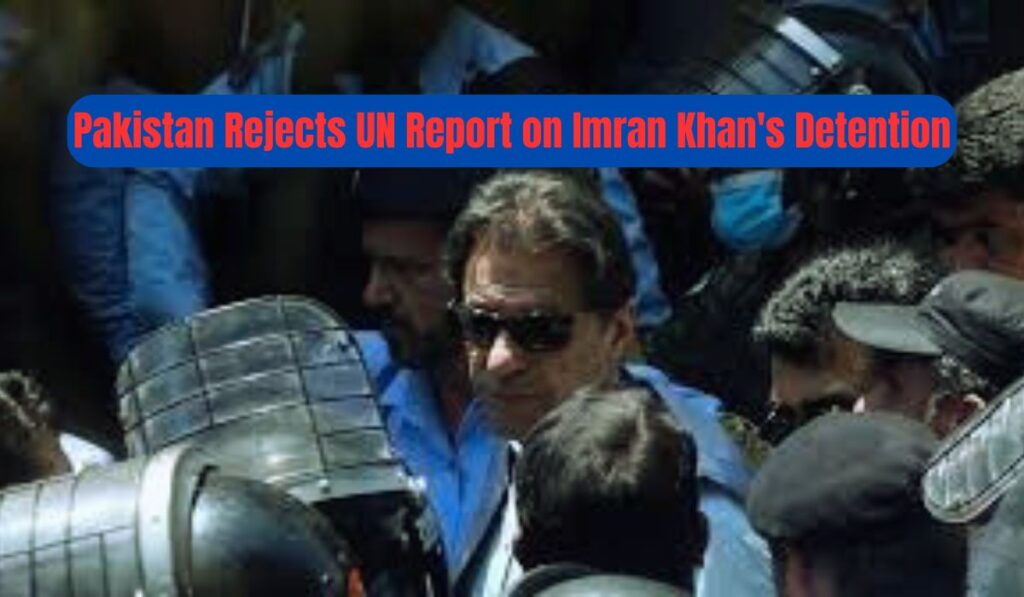Pakistan’s Foreign Office (FO) has firmly rejected a recent report from a United Nations (UN) panel that criticizes the detention of former Prime Minister Imran Khan. The report has been met with strong disapproval from the FO, which argues that the UN panel’s assessment is unfounded and does not accurately reflect the legal and procedural context of Khan’s detention.
During a media briefing, FO spokesperson Mumtaz Zahra Baloch addressed the issue, emphasizing that the report is based on a biased and incomplete understanding of the situation. Baloch highlighted that Pakistan’s legal system operates within a framework of due process and that all actions taken regarding Khan’s detention are consistent with national laws and regulations.
The FO’s response underscores its stance on maintaining sovereignty over domestic legal matters and its commitment to ensuring that justice is administered fairly and transparently. By publicly challenging the UN panel’s findings, the Foreign Office aims to defend the integrity of Pakistan’s judicial processes and address any misconceptions about the country’s legal practices.
Summary of the Report
- Report Issuer: UN Working Group on Arbitrary Detention
- Subject: Detention of Imran Khan, former Prime Minister.
- Key Findings: The report called the detention “arbitrary” and lacking a legal basis, suggesting it was politically motivated.
- Recommendations: Immediate release of Imran Khan and reforms to align with international human rights standards.
FO’s Response
1. Rejection of the Report
The FO spokesperson stated that the report is “unwarranted” and reflects an incomplete understanding of Pakistan’s legal and judicial system.
Key Points from the FO’s Rejection:
- Lack of Objectivity: The report lacks objectivity and does not accurately represent Pakistan’s legal processes.
- Incomplete Understanding: It is based on a flawed and incomplete understanding of the legal framework in Pakistan.
Quote from FO Spokesperson:
Ms. Baloch said, “I won’t go into the thought processes of any association or any country on the new reports or explanations they have made. However, I would like to underline that a report on any particular case is unwarranted when it lacks objectivity and is based on an incomplete and inaccurate understanding of Pakistan’s legal and judicial system.”
Context of Imran Khan’s Detention
1. Legal Challenges
Imran Khan has been facing several legal cases since his removal from office in 2022, including:
- Corruption Charges
- Incitement
2. UN’s Perspective
The UN Working Group argued that Khan’s detention:
- Lacked Legal Grounds: They believe the prosecution was not based on legal merit.
- Was Politically Motivated: They suggested it aimed to disqualify Khan from future political participation.
Defense of Pakistan’s Legal System
1. Constitutional Guarantees
Ms. Baloch emphasized that Pakistan’s Constitution guarantees the rights and freedoms of all citizens.
2. Independent Judiciary
She reiterated that Pakistan has a robust judicial system with independent courts that:
- Uphold the Rule of Law: Ensure justice is served according to Pakistani laws.
- Provide Redressal Mechanisms: Offer adequate avenues for individuals to seek justice and address grievances.
Quote from FO Spokesperson:
“Pakistan is a dynamic vote-based system with powerful foundations set up for administering equity and maintaining law and order,” Ms. Baloch stated.
Conclusion
Pakistan’s Foreign Office has issued a strong reaffirmation of its support for the country’s legal system, firmly rejecting the recent United Nations report as biased and inaccurate. The Foreign Office argues that the report fails to provide a balanced perspective and misrepresents the facts surrounding the issue at hand.
In its response, the Foreign Office emphasizes that Pakistan’s legal system is robust, transparent, and adheres to principles of justice and fairness. It underscores the country’s commitment to upholding justice through its well-established legal mechanisms, which are designed to ensure accountability and protect the rights of all individuals.
The FO’s statement reflects Pakistan’s confidence in its judicial processes and its determination to address and rectify any issues through its own legal channels, rather than accepting external critiques that it deems unjustified. This stance highlights Pakistan’s assertion of sovereignty and its belief in the integrity of its domestic legal framework.
References:
- Dawn. (2024, July 4). FO rejects the UN board’s report on Imran’s detainment. Retrieved from Dawn.com

